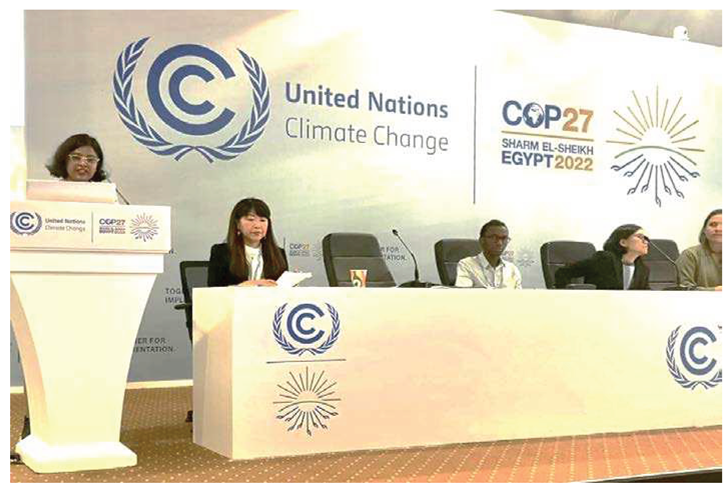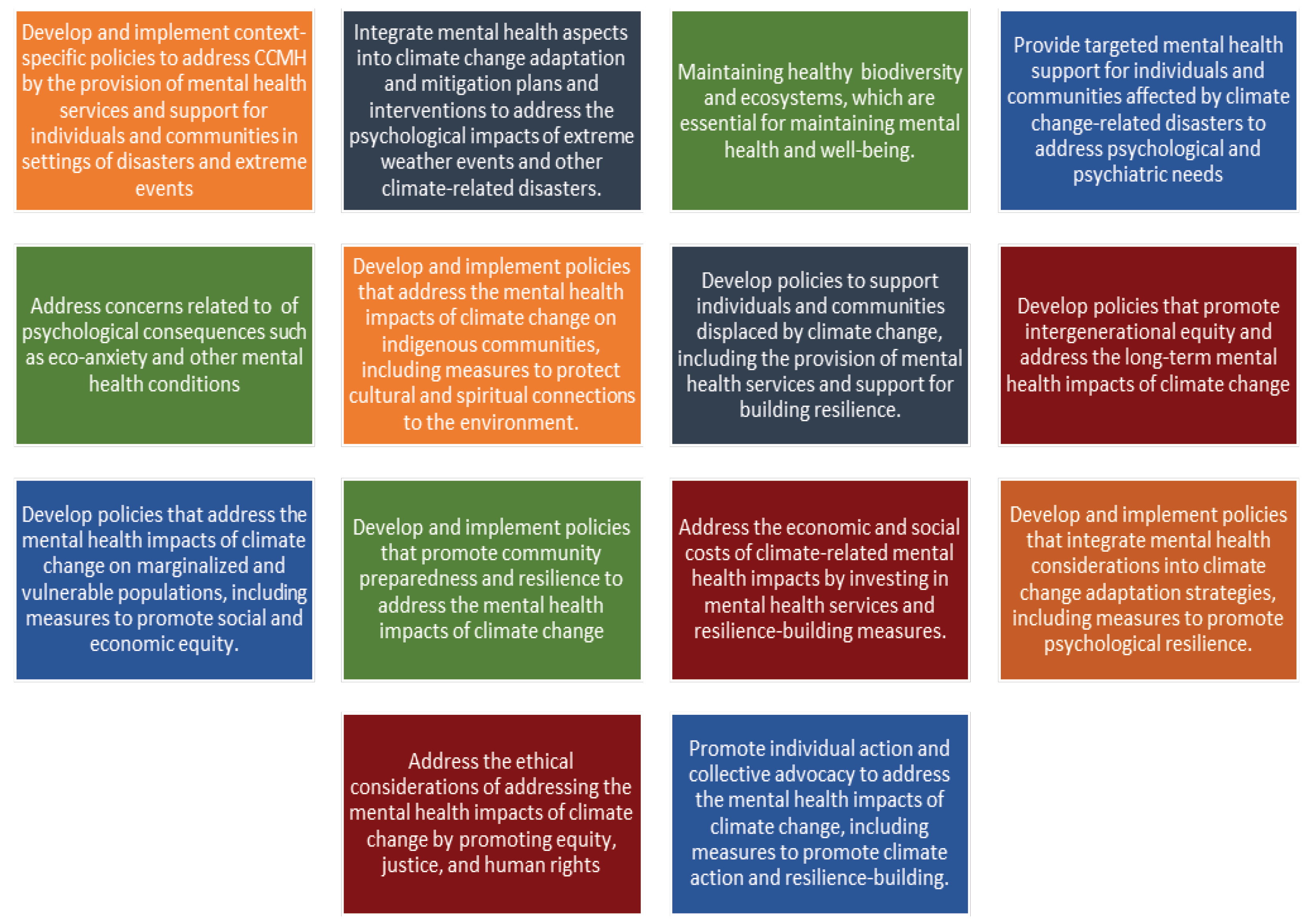Submitted:
05 September 2023
Posted:
07 September 2023
You are already at the latest version
Abstract
Keywords:
1. Introduction
- What direct and indirect drivers influence the mental health consequences of climate shocks and disasters, and how do these factors interact with individuals' short-term and long-term mental health outcomes?
- How can climate change-related disasters' mental health and psychosocial well-being impacts be effectively integrated into climate change and disaster risk management strategies, moving beyond focusing solely on response, recovery, and adaptation?
- What interventions, programs, policies, and practices can be developed and implemented to enhance, protect, and promote psychosocial health in the context of climate change impacts, mainly focusing on health equity and vulnerable populations?
2. Project and the Methodological Approach


3. Results
3.1. The Climate Change and Mental Health Discourses
Academic Discourse
Media Discourse
Community and Policy discourse (Stakeholders, policymakers, and community organizations )
Cross-cutting discourse : Climate change-induced human mobility and cascading (mental) health impacts.
3.2. Case-study approach to explain various psychosocial challenges and mental stress communities experience.
3.2.1. Case Study 1: Developing state with a high frequency of disaster events (i.e., floods, storms, etc.) – Bangladesh
3.2.2. Case study 2: How are emerging economies building a holistic climate resilience – Indonesia
- Climate change and extreme events have multifaceted impacts on individuals and communities; community support and engagement positively affect mental health in post-disaster situations.
- While communities usually show solidarity during crises, some individuals feel guilty for not being able to help others while trying to save their own homes.
- People affected by flooding suffer adverse mental health impacts, including exhaustion, stress, anxiety, and uncertainty. They feel fear and isolation during the flood events.
5. Key Discussion Points
Multifaceted narratives
Gaps and Needs
Need for Collaborative and interdisciplinary approach.
- Acknowledging the Complex Challenges: Interconnected challenges such as climate change, water stress, disasters, and health crises, directly and indirectly, impact sustainable development for states and communities, and they require collaborative solutions; in this discourse, finding the focus for CCMH nexus is essential.
- Prioritize overlooked issues in climate research, policy, and action: mental health impacts of climate change have recently come to the forefront of climate impact discussion, sometimes noting the direct and often indirect connection between climate crises-mental health- psychosocial well-being and taking note of the emerging scholarship on this topic, this primarily overlooked aspect in climate action planning must get priority attention.
- Integration of Climate-Related Direct and Indirect Drivers of Mental Health in Climate Services: Addressing both direct and indirect drivers of mental health impacts is critical for designing prevention, support systems, and long-term resilience building in affected communities, particularly in the settings of disaster, where shock and trauma can set in immediately.
- Boosting Collaborative Research: CCMH research necessitates an innovative and cooperative approach involving experts from multiple fields to understand the socio-economic and socio-cultural complexity of the problem. In addition, such systems must be configured for specific climate crisis settings like heat impact causing immediate anxiety.
- Reckoning Unequal Distribution of these impacts: Mental health impacts of climate change disproportionately affect certain groups based on age, gender, race, and socioeconomic status. These elements remain key while collecting data and information and conducting assessments toward mapping the situation.
- Understanding the ‘locale context’ while creating Support Programs: Effective mental health support programs and interventions are limited due to sociocultural and socioeconomic dimensions. In such a context, designing such programs to be sensitive to these factors and identifying entry points for better ‘buy in’ the community, for example, working with village or community elders.
- Challenges the gaps in existing Support Mechanisms: The processes and mechanisms to support climate-related mental health services often lack coordination, clear action plans, and initiatives to address specific challenges and support affected populations adequately. For example, the guidelines for managing the impacts of heat can significantly differ from addressing the shock and trauma after a disaster like a flood. While the need for standards of practice for a CCMH plan is essential, a blueprint for action has to be situation-specific.
- Importance of Research and Research Funding: Noting the above-outlined gaps and needs, investing in CCMH research can bridge the gap between scientific knowledge and practical application, leading to scalable solutions and transformative change toward creating resilient societies. Interdisciplinary research involving stakeholders from various sectors is pertinent for understanding and addressing complex problems like the CCMH nexus.
- Preparedness and Collective Action: Prepared communities and countries can effectively implement research findings, best practices, and innovative solutions and support efforts, including research and community capacity building toward a deeper understanding of these complex issues.
- Steering integrated agendas for coordinated climate action: The need for enhanced recognition of the climate and mental health nexus in global climate change-focused commitments such as the Paris Declaration, SDGs, and Sendai Framework for Disaster Risk Reduction. Integrated climate action planning could help address mental health impacts in the context of climate change and disaster events via coordinated efforts across various stakeholders to provide appropriate care and policy support.
5. Conclusions
References
- Hrabok, M.; Delorme, A.; Agyapong, V.I. Threats to mental health and well-being associated with climate change. Journal of Anxiety Disorders. 2020, 1, 102295. Available online: https://www.sciencedirect.com/science/article/abs/pii/S0887618520301092. [CrossRef]
- Boyd, E.; Chaffin, B.C.; Dorkenoo, K.; Jackson, G.; Harrington, L.; N'guetta, A.; Johansson, E.L.; Nordlander, L.; De Rosa, S.P.; Raju, E.; Scown, M. Loss and damage from climate change: A new climate justice agenda. One Earth. 2021, 22, pp. 1365–1370. Available online: https://www.cell.com/one-earth/fulltext/S2590-3322(21)00537-6?_returnURL=https%3A%2F%2Flinkinghub.elsevier.com%2Fretrieve%2Fpii%2FS2590332221005376%3Fshowall%3Dtrue (accessed on 14 June 2022).
- Corvalan, C.; Gray, B.; Prats, E.V.; Sena, A.; Hanna, F.; Campbell-Lendrum, D. Mental health and the global climate crisis. Epidemiology and Psychiatric Sciences 2022, 31, e86. Available online: https://www.cambridge.org/core/journals/epidemiology-and-psychiatric-sciences/article/mental-health-and-the-global-climate-crisis/EF66D5A04141C3F91661B175AFFCD20D. [CrossRef] [PubMed]
- Charlson, F.; Ali, S.; Augustinavicius, J.; Benmarhnia, T.; Birch, S.; Clayton, S.; Fielding, K.; Jones, L.; Juma, D.; Snider, L.; Ugo, V. Global priorities for climate change and mental health research. Environment international 2022, 1, 106984. Available online: https://www.sciencedirect.com/science/article/pii/S0160412021006097. [CrossRef] [PubMed]
- Charlson, F.; Ali, S.; Benmarhnia, T.; Pearl, M.; Massazza, A.; Augustinavicius, J.; Scott, J.G. Climate change and mental health: a scoping review. International journal of environmental research and public health. 2021, 18, p. 4486. Available online: https://www.mdpi.com/1660-4601/18/9/4486 (accessed on 8 May 2022).
- Li, A.; Toll, M.; Martino, E.; Wiesel, I.; Botha, F.; Bentley, R. Vulnerability and recovery: Long-term mental and physical health trajectories following climate-related disasters. Social Science & Medicine 2023, 320, 115681. Available online: https://www.sciencedirect.com/science/article/pii/S0277953623000369.
- Xatamovich, A.I.; Maidanovich, K.N. Climate Change and Its Impact on Increasing Poverty. International Journal of Multicultural and Multireligious Understanding 2022, 9, 485–493. Available online: https://ijmmu.com/index.php/ijmmu/article/view/4348.
- Chowdhury, M.A.; Hasan, M.K.; Hasan, M.R.; Younos, T.B. Climate change impacts and adaptations on the health of Internally Displaced People (IDP): An exploratory study on coastal areas of Bangladesh. Heliyon. 2020, 6. Available online: https://pubmed.ncbi.nlm.nih.gov/33024856/. [Google Scholar] [CrossRef]
- EM-DAT. Disasters Year in Review 2022. The Emergency event database (EM-DAT), 2023, 70. Available online: https://cred.be/sites/default/files/2022_EMDAT_report.pdf.
- Cunsolo, A.; Ellis, N.R. Ecological grief as a mental health response to climate change-related loss. Nature Climate Change 2018, 8, 275–281. Available online: https://www.nature.com/articles/s41558-018-0092-2. [CrossRef]
- Hayward, G.; Ayeb-Karlsson, S. ‘Seeing with Empty Eyes’: a systems approach to understand climate change and mental health in Bangladesh. Climatic Change. 2021, 165, 29. Available online: https://link.springer.com/article/10.1007/s10584-021-03053-9. [CrossRef]
- IPCC, 2022: Climate Change (2022): Impacts, Adaptation, and Vulnerability. Contribution of Working Group II to the Sixth Assessment Report of the Intergovernmental Panel on Climate Change [H.-O. Pörtner, D.C. Roberts, M. Tignor, E.S. Poloczanska, K. Mintenbeck, A. Alegría, M. Craig, S. Langsdorf, S. Löschke, V. Möller, A. Okem, B. Rama (eds.)]. Cambridge University Press. In Press. Available online: https://www.ipcc.ch/report/sixth-assessment-report-working-group-ii/.
- Cianconi, P.; Hanife, B.; Grillo, F.; Betro, S.; Lesmana, C.; Janiri, L. Eco-emotions and Psychoterratic Syndromes: Reshaping Mental Health Assessment Under Climate Change. The Yale Journal of Biology and Medicine 2023, 96, 211–226. Available online: https://europepmc.org/article/pmc/pmc10303262. [CrossRef]
- Cianconi, P.; Betrò, S.; Janiri, L. The impact of climate change on mental health: a systematic descriptive review. Frontiers in psychiatry 2020, 6, 74. Available online: https://www.frontiersin.org/articles/10.3389/fpsyt.2020.00074/full?ref=lawyersfornature.com. [CrossRef]
- Lawrance, E.; Thompson, R.H.; Fontana, G.I.; Jennings, N. The impact of climate change on mental health and emotional wellbeing: current evidence and implications for policy and practice. 2021. Available online: https://www. Imperial. Ac. Uk/Grantham/publications/all-publications/the-impact-of-climate-change-on-mentalhealth-and-emotional-wellbeing-current-evidence-and-implications-for-policy-and-practice. php. 13.
- WHO (2022) Mental Health and Climate Change: Policy Brief. Geneva: World Health Organization. Available online: https://www.who.int/publications/i/item/9789240045125. (Accessed on 23 March 2022).
- Nagabhatla, N.; Okamoto, S.; Bhandari, S. The new normal of Climate Grief: Why mental must feature in adaptation and resilience planning. UNU-MERIT, UNU-CRIS, UNU-IIGH. 2021. Available online: https://cris.unu.edu/new-normal-%E2%80%98climate-grief%E2%80%99-why-mental-health-must-feature-adaptation-and-resilience-planning.
- Lawrance, E.L.; Thompson, R.; Newberry Le Vay, J.; Page, L.; Jennings, N. The impact of climate change on mental health and emotional wellbeing: a narrative review of current evidence, and its implications. International Review of Psychiatry 2022, 34, 443–498. Available online: https://www.tandfonline.com/doi/full/10.1080/09540261.2022.2128725. [CrossRef]
- Okamoto, S.; Nagabhatla, N. Climate change’s impact on mental health is overlooked and misunderstood – here is what can be done. The Conversation UK. 2022. Available online: https://theconversation.com/climate-changes-impact-on-mental-health-is-overlooked-and-misunderstood-heres-what-can-be-done-194128.
- Woodhall-Melnik, J.; Grogan, C. Perceptions of mental health and wellbeing following residential displacement and damage from the 2018 St. John River Flood. International journal of environmental research and public health 2019, 16, 4174. Available online: https://www.mdpi.com/1660-4601/16/21/4174. [CrossRef] [PubMed]
- Hagenlocher, M.; Okamoto, S.; Nagabhatla, N.; Diedrich, S.; Hassel, J.; van der Heijden, S.; Kreft, S.; De Lombardi, P.; Nick, F.; Oakes, R.; Rackelmann, F.; Rimmert, M.; Sandholz, S.; Sebesvari, Z.; Shen, X.; Skripka, T.; Stojanovic, T.; Szarzynski, J.; Van de Walle, B.; Werners, S. Building climate resilience: Lessons from the 2021 floods in Western Europe. Bonn, Germany; Brugge, Belgium; Maastricht, Netherlands; UNU-EHS, UNU-CRIS, UNU-MERIT. 2022. Available online: http://collections.unu.edu/view/UNU:9123.
- The Guardian. Climate crisis inflicting huge ‘hidden costs’ on mental health. The Guardian. 2021. Available online: https://www.theguardian.com/environment/2021/may/26/climate-crisis-inflicting-huge-hidden-costs-mental-health. (Accessed on 14 March 2022).
- CNN (2022). Do you have 'eco-anxiety'? Here is how to find out. Jessica DuLong, January 28, 2022; CNN. Available online: https://edition.cnn.com/2022/01/28/health/eco-anxiety-harmful-for-health-wellness/index.html (Accessed on: 14 March 2022).
- BBC (2022). GLOBAL WARMING The invisible impact of climate change. By Martin Montague. 2020. Available online: https://www.bbcearth.com/news/the-invisible-impact-of-climate-change. (Accessed on: 14 March 2022).
- Comtesse, H.; Ertl, V.; Hengst, S.M.; Rosner, R.; Smid, G.E. Ecological grief as a response to environmental change: a mental health risk or functional response? International journal of environmental research and public health 2021, 18, 734. Available online: https://www.mdpi.com/1660-4601/18/2/734. [CrossRef] [PubMed]
- Baudon, P.; Jachens, L. A scoping review of interventions for the treatment of eco-anxiety. International journal of environmental research and public health 2021, 18, 9636. Available online: https://www.mdpi.com/1660-4601/18/18/9636. [CrossRef]
- Clayton, S.; Karazsia, B.T. Development and validation of a measure of climate change anxiety. Journal of Environmental Psychology 2020, 69, 101434. Available online: https://www.sciencedirect.com/science/article/abs/pii/S0272494419307145. [CrossRef]
- Policy Department for Economic, Scientific, and Quality of Life Policies (IPOL). Climate change and its impact on mental health. BRIEFING Requested by the ENVI committee in EU Parliament Directorate-General for Internal Policies, Author: Maria NILSSON PE 658.210. 2020. Available online: www.europarl.europa.eu/supporting-analyses. (Accessed on 09 June 2022).
- NIHCM. Climate Change Is Affecting Our Mental Health. Behavioral Health / Environmental Health. 2022. Available online: https://nihcm.org/publications/climate-change-is-affecting-our-mental-health.
- International Summit on Psychology and Global Health- A leaser in Climate Action. “International Leaders of Psychology Issue Resolution Affirming Climate Change a ‘Serious Global Threat.” 2019. Available online: https://www.psychologyandglobalhealth.org/. (Accessed on 19 March 2022).
- Patel, S.K.; Agrawal, G.; Mathew, B.; Patel, S.; Mohanty, B.; Singh, A. Climate change and women in South Asia: a review and future policy implications. World Journal of Science, Technology and Sustainable Development. 2020, 17, 145–166. Available online: https://www.emerald.com/insight/content/doi/10.1108/WJSTSD-10-2018-0059/full/html. [CrossRef]
- Bachri, S.; Sumarmi, S.; Irawan, L.Y.; Aldianto, Y.E.; Utomo, K.S.; Wardhani, A.K. Coping Mechanism in the Face of Landslide Hazard in East Java Indonesia. Geo Journal of Tourism and Geosites. 2022, 40, 144–149. [Google Scholar] [CrossRef]
- Hayes, K.; Berry, P.; Ebi, K.L. Factors influencing the mental health consequences of climate change in Canada. International journal of environmental research and public health 2019, 16, 1583. Available online: https://www.mdpi.com/1660-4601/16/9/1583. [CrossRef]
- Shultz, J.M.; Rechkemmer, A.; Rai, A.; McManus, K.T. Public health and mental health implications of environmentally induced forced migration. Disaster medicine and public health preparedness 2019, 13, 116–122. Available online: https://www.cambridge.org/core/journals/disaster-medicine-and-public-health-preparedness/article/abs/public-health-and-mental-health-implications-of-environmentally-induced-forced-migration/3A35B8A65464B46ADA35418E627689A6. [CrossRef]
- Oakes, R.; Banerjee, S.; Warner, K. 9 Human mobility and adaptation to environmental change. World Migration Report 2020, e00019. Available online: https://www.onedayswages.org/wp-content/uploads/2020/04/wmr_2020_en_ch_9.pdf. [CrossRef]
- Haque, R.; Parr, N.; Muhidin, S. Climate-related displacement, impoverishment and healthcare accessibility in mainland Banglades. Asian Population Studies 2020, 16, 220–239. Available online: https://www.tandfonline.com/doi/abs/10.1080/17441730.2020.1764187. [CrossRef]
- Romanello, M.; McGushin, C.; Di Napoli, A.; Drummond, P.; Hughes, N.; et al. The 2021 report of the Lancet Countdown on health and climate change: code red for a healthy future. The Lancet 2021, 398, 1619–1662. Available online: https://www.thelancet.com/article/S0140-6736%2821%2901787-6/fulltext. [CrossRef] [PubMed]
- Islam, S.; Mozumder, M.K. Challenges to providing quality mental health services for forcibly displaced populations: The case of Rohingya refugees in Bangladesh. Asian American Journal of Psychology 2021, 12, 234. Available online: https://psycnet.apa.org/record/2021-90302-008. [CrossRef]
- Muhammad, I.; Priyono, I.A.; Rahmania, O.; Maulana, M.R.; Silitonga, B.M.; Taufiqurrahman, M.R. Mapping of Landslide Potential Zone with Frequency Ratio Method and Mitigation Efforts in Banjarnegara Regency, Central Java, Indonesia. Journal of Social Science 2022, 3, 633–640. Available online: https://jsss.co.id/index.php/jsss/article/view/354. [CrossRef]
- Burrows, K.; Desai, M.U.; Pelupessy, D.C.; Bell, M.L. Mental well-being following landslides and residential displacement in Indonesia. SSM-mental health. 2021, 1, 100016. Available online: https://wwwsciencedirectcom/science/article/pii/S2666560321000165. [CrossRef]
- Rahman, M.S.; Andriatmoko, N.D.; Saeri, M.; Subagio, H.; Malik, A.; Triastono, J.; Oelviani, R.; Kilmanun, J.C.; da Silva, H.; Pesireron, M.; Senewe, R.E. Climate disasters and subjective well-being among urban and rural residents in Indonesia. Sustainability 2022, 14, 3383. Available online: https://www.mdpi.com/2071-1050/14/6/3383. [CrossRef]
- Hayes, K.; Poland, B.; Cole, D.C.; Agic, B. Psychosocial adaptation to climate change in High River, Alberta: Implications for policy and practice. Canadian Journal of Public Health 2020, 11, 880–889. Available online: https://www.ncbi.nlm.nih.gov/pmc/articles/PMC7728975/. [CrossRef]

Disclaimer/Publisher’s Note: The statements, opinions and data contained in all publications are solely those of the individual author(s) and contributor(s) and not of MDPI and/or the editor(s). MDPI and/or the editor(s) disclaim responsibility for any injury to people or property resulting from any ideas, methods, instructions or products referred to in the content. |
© 2023 by the authors. Licensee MDPI, Basel, Switzerland. This article is an open access article distributed under the terms and conditions of the Creative Commons Attribution (CC BY) license (http://creativecommons.org/licenses/by/4.0/).




